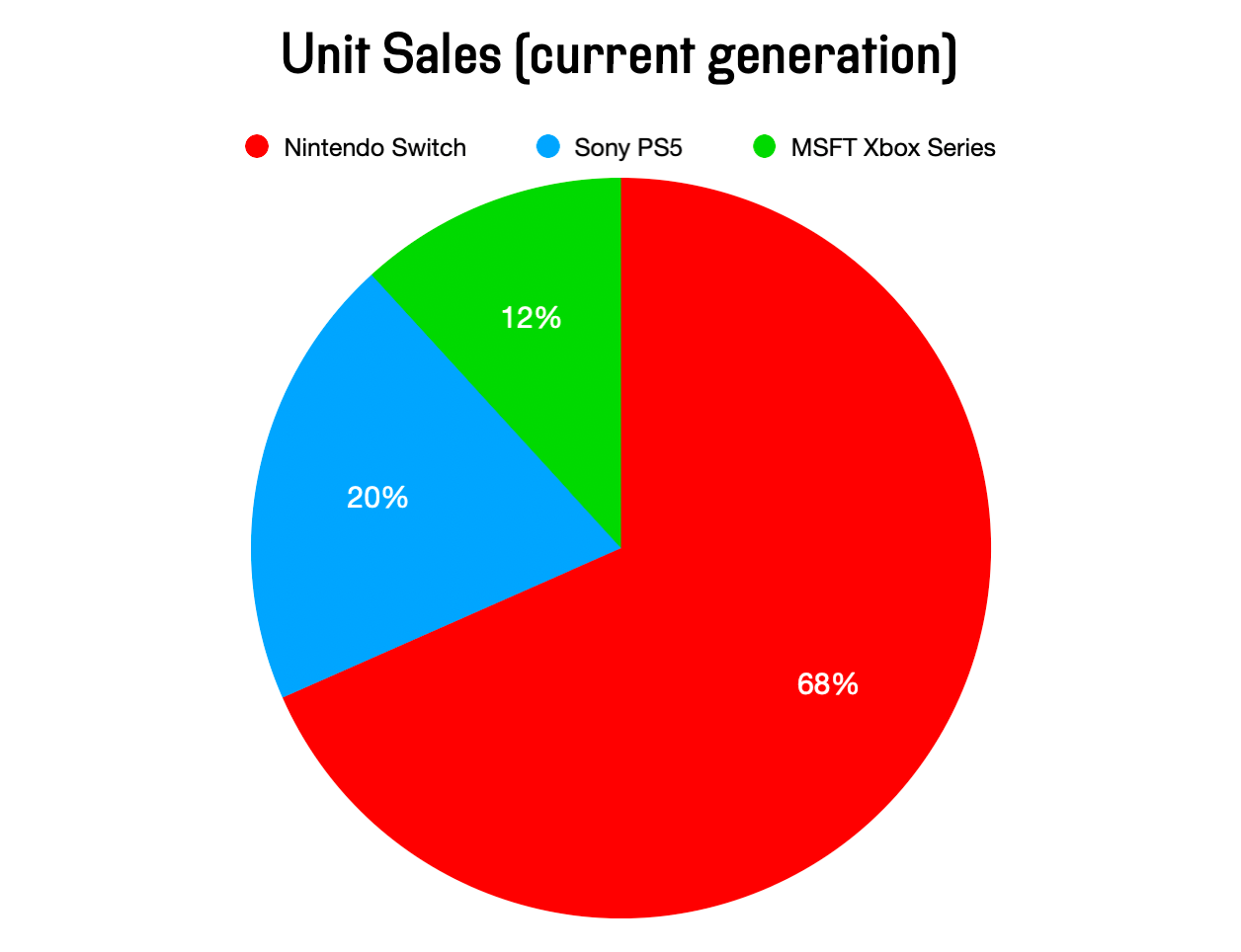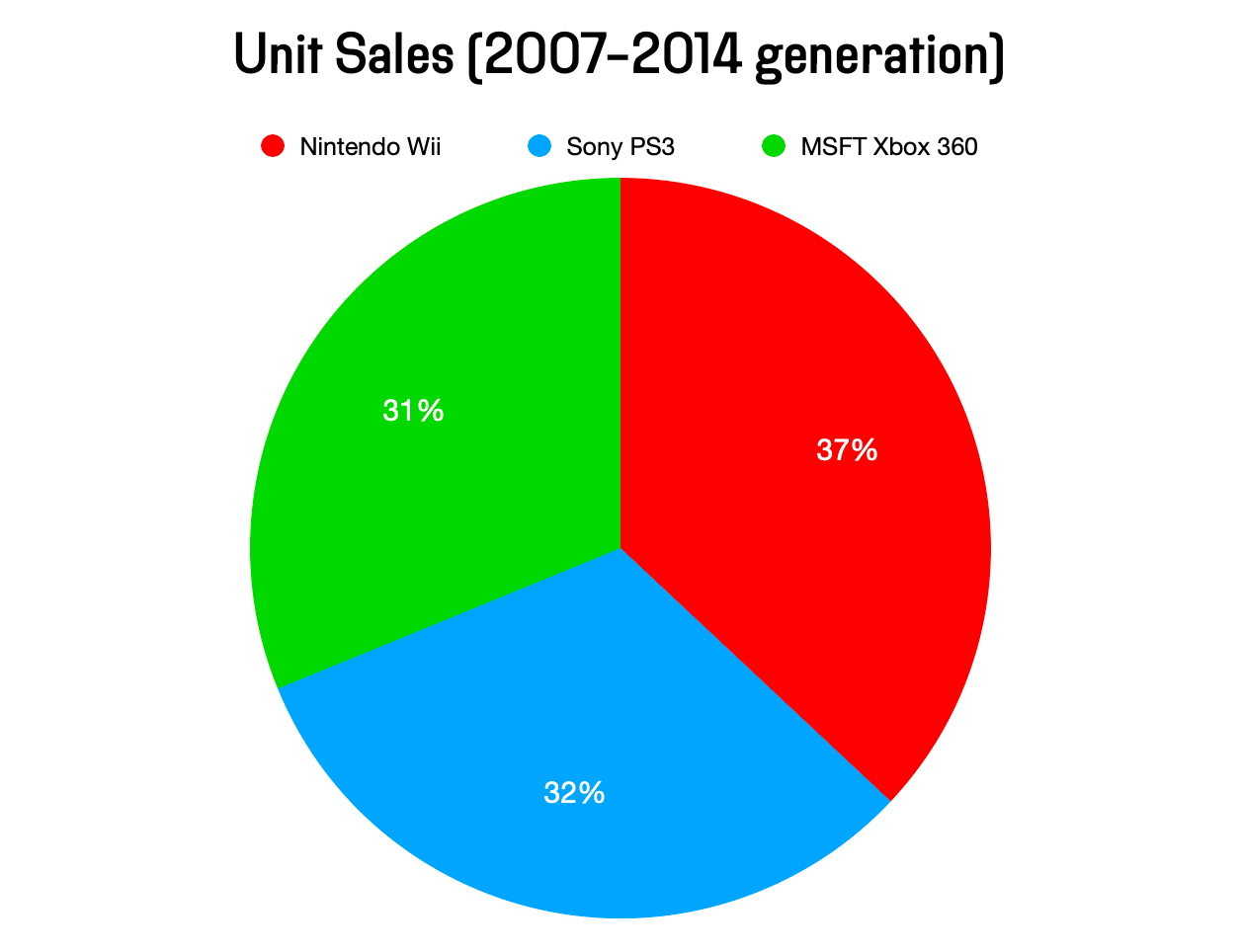Defining the Video Game Market

One surefire way to fire me up is to hear tech commentators talk about gaming. it's not that they're forbidden from doing it, but the most wrong takes from tech folks I've heard in the past decade have been in this area. "Nintendo should give up on hardware and make iPhone games." "The PS4 and Xbox One will sell terribly and be the last home consoles." "Stadia has cool tech and will therefore succeed!"
Last week, I posted this clip from the most recent Sharp Tech episode where Andrew Sharp explained to cohost Ben Thompson why it's ridiculous to equate Sony buying small studios and building them up into giants and Microsoft trying to buy the biggest game studio in the world, Activision Blizzard, and today I wanted to add a few more thoughts.
Sony Bought Studios, it's No Different Than Microsoft Doing it Too
Sony acquired Naughty Dog in 2001 when the studio had created a few games you've never heard of, as well as Crash Bandicoot. Yes, Naughty Dog is an amazing studio today, making The Last of Us and Uncharted franchises, but those started 12 and 6 years after the acquisition, respectively.
Sony acquired Guerrilla Games in 2005, a studio who released 2 games the year before the acquisition, one with middling reviews and the other which got panned. Again, the Horizon franchise didn't start for 12 years after the acquisition.
But surely Sony's most recent and largest ever acquisition, Bungie, must be comparable, right? Well, Bungie does have a long history, notably creating the Halo and Destiny franchises. Although in this case, Bungie does not bring the Halo franchise with it, only Destiny. Also, the acquisition was $3.7 billion, or about 5% of what Microsoft wants to pay for Activision Blizzard.
You can mention that Sony has bought up studios in the past, but it's ridiculous to equate the significance of these acquisitions and keep a straight face.
Microsoft is an Also-Ran in Gaming and Should Get Out of the Market if This Deal is Blocked
Again, straight up bananas, but Ben keeps saying this. This of course comes after he's upset with governing bodies for mischaracterizing markets:
The key issue here, as is so often the case in antitrust decisions, revolves around market definition. In this case the CMA considered cloud gaming as a completely separate market from console gaming; given that Microsoft is the largest player in cloud gaming, it ought not be allowed to acquire Activision. There is zero consideration given to the point in this paragraph, which is that cloud gaming is an alternative to console gaming precisely because it is competitive with cloud gaming, which means it is a part of the same market.
So Ben thinks that console games and cloud games are the same market, because someone who chooses to play a game on a cloud service is choosing not to play on a console.
Microsoft is going to appeal this decision; if they fail, and pull out of console gaming entirely, the CMA will have not just unwittingly reproduced a PlayStation controller, but ensured Sony is dominant in consoles for a very long time to come.
Look, I could go deep on the numbers here, but it's very funny to see complaints about other people defining markets to suit their needs and that the market will say the same as it is today, only to do exactly that yourself.
Per Ben's arguments, the market he's talking about includes Sony PlayStations, Microsoft Xboxes, and potential cloud products from those two companies. Not included are Nintendo, who is by far the console market leader, nor does it include other cloud gaming services (like GeForce Now). It also doesn't count Windows, nor does it count iOS and Android.
But let's meet halfway, add Nintendo to the mix and indulge this idea that home consoles from Sony, Microsoft, and Nintendo don't compete with anything else, and look at the unit sales numbers from the last 3 generations of consoles:

Nintendo is currently dominating the market, and not just because it went on sale a few years before the other ones, it was also the leader in unit sales in 2022.
But let's go back to the previous generation of sales, the PS4, Xbox One, and Wii U generation:

The proportions are very similar to the last chart, but the roles are switched (if you will). Sony was the clear leader, with Microsoft a distant second and Nintendo really nowhere at all.
Let's go back one more gen…

This was about as equal as things ever were, as Nintendo technically won, but this was the most balanced market I think you could ever expect.
My point is that the assertion that if Microsoft cannot buy the biggest game studio in the world, that Sony's dominant position in console gaming is "ensured […] for a very long time to come" is absurd. Sony is already not the dominant player in the space, so the assertion that the CMA just locked in that dominance forever is only sensible if you grossly gerrymander the market to hell.
Also, it's worth noting all the charts above are showing worldwide unit sales, which makes Xbox look worse as it is primarily marketed and sold to the US market. Sony still edges them out in US sales, but it's much closer. The Xbox 360 was also dominant over Sony's PS3 years, and it was only at the end of the generation that Sony squeaked ahead overall.
Should Microsoft ditch console gaming altogether? I don't think so. Ben may only have interest in Microsoft staying in markets where they can be number one, but I don't think that's a good way to look at things. If nothing else, I think that there is intangible value in Microsoft having a popular, well-known consumer lineup that helps soften their appearance to ordinary people. I also think that Xbox consoles help buttress Microsoft's PC gaming efforts through services like Game Pass.
Or maybe they should! Let Sony and Nintendo fight it out in hardware, and focus more on the cloud infrastructure and apps-you-use-at-work-and-kinda-hate services they are more dominant in today. Maybe there actually is a business case to be made that this isn't worth it, but as a fan of compention in the gaming market, I hope that Microsoft stays around and is forced to innovate instead of just throwing around $70 billion because they can and no one else can.
At the very least, we should be able to talk about this without hilariously mis-defining the console gaming market.
Discussion